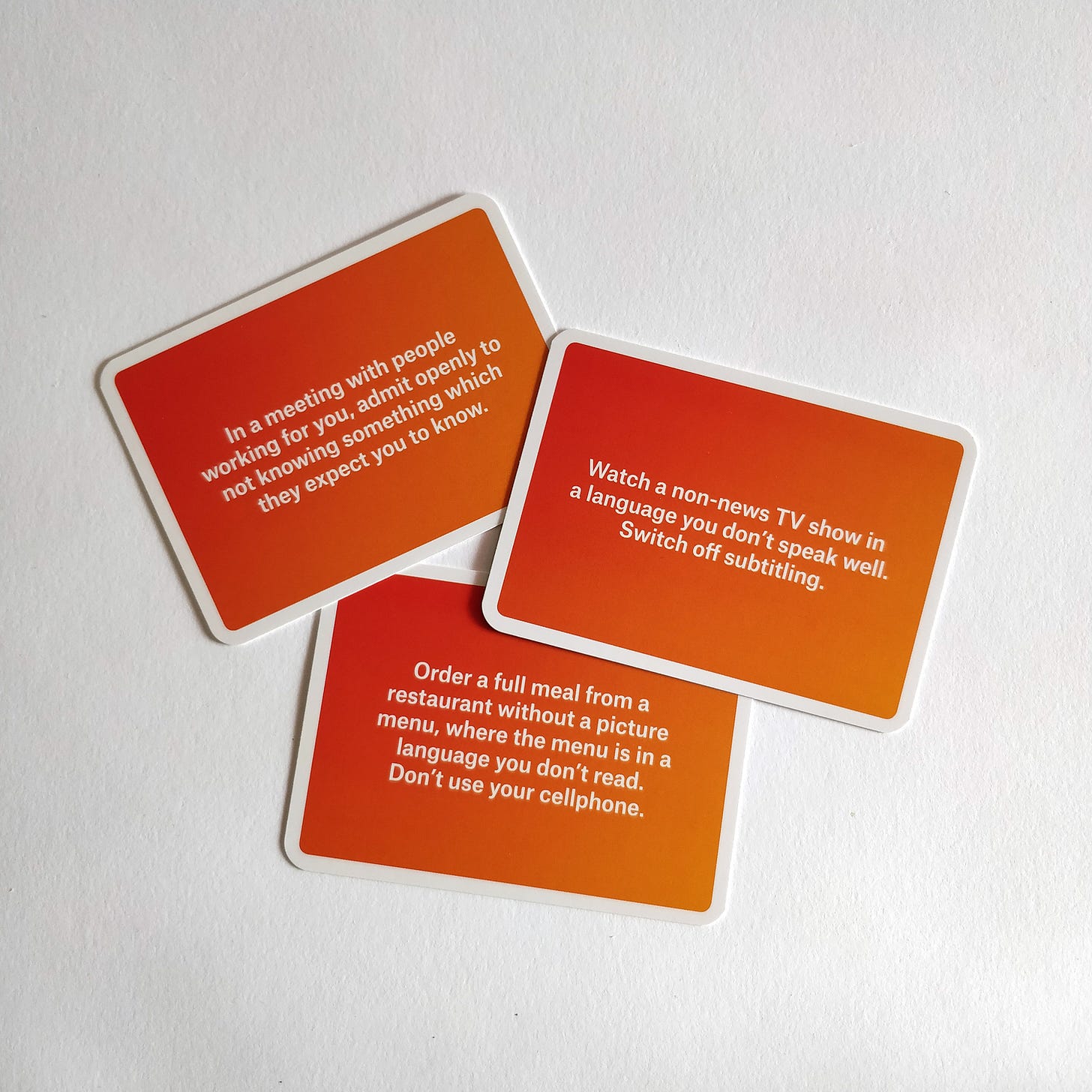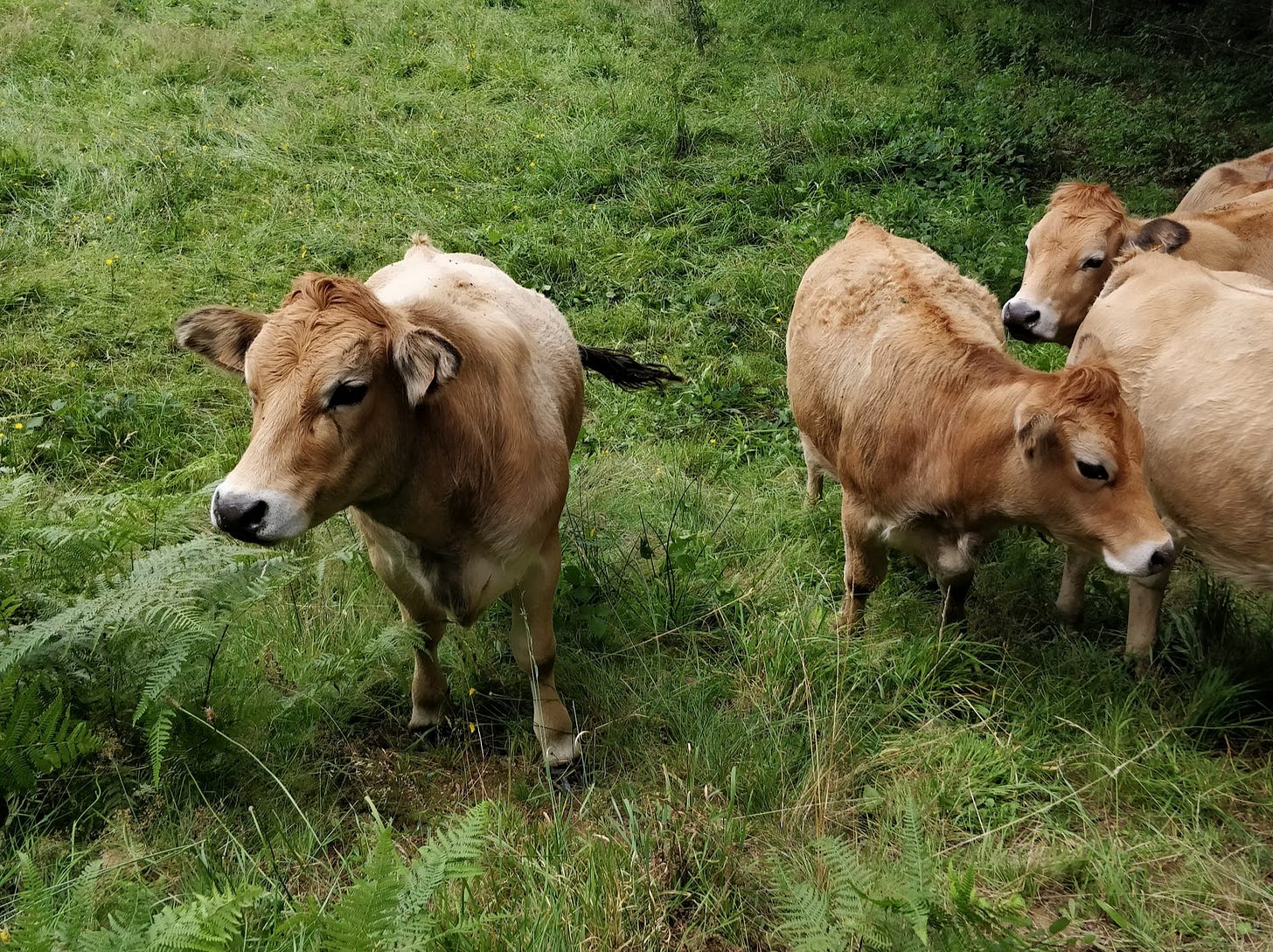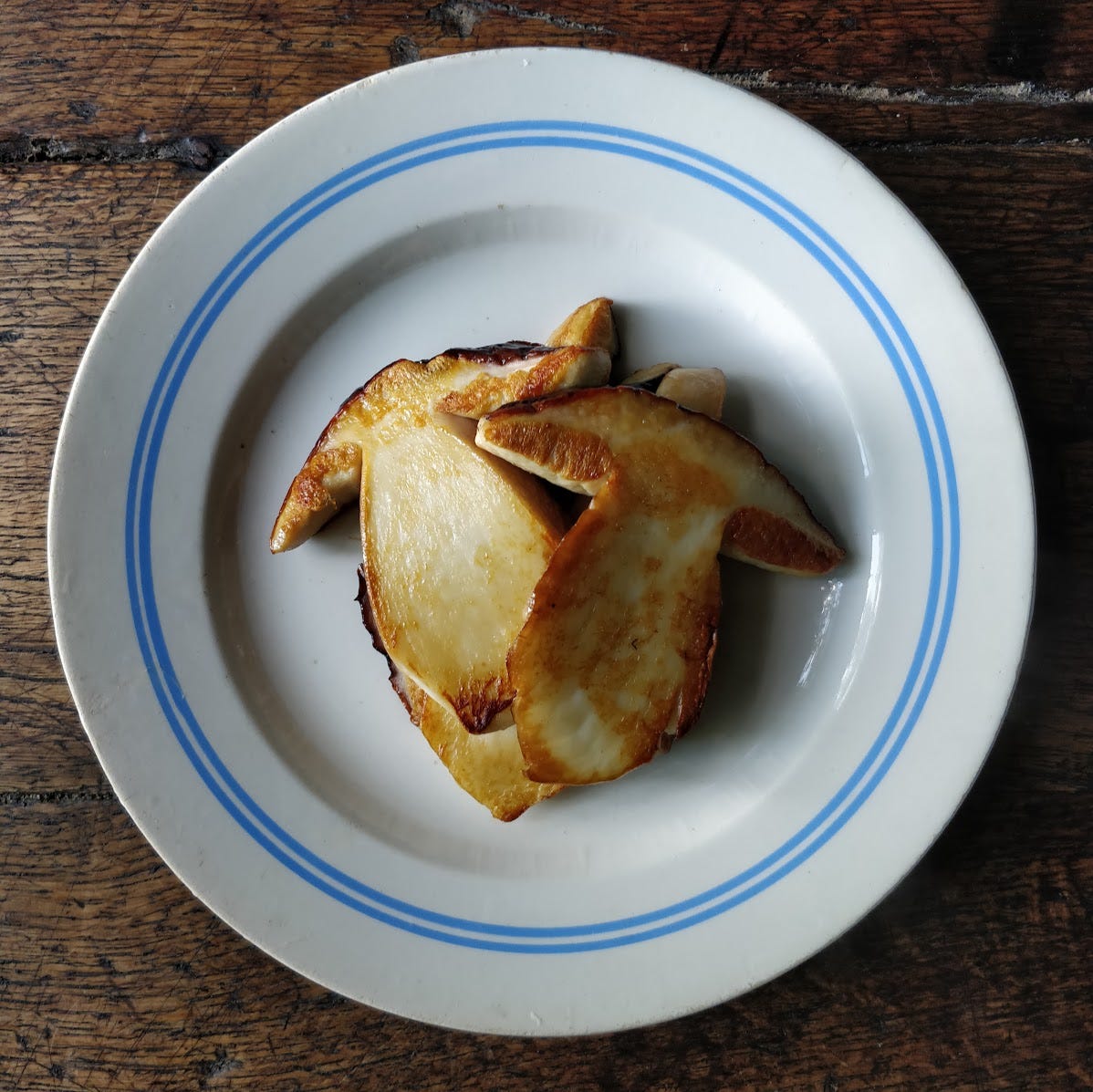Re-learning productive discomfort
idk v3.0 🤷🏻♂️ — and updates on what else has been going on.
Hello, friends!
tl;dr: Have you noticed that you’re stuck because so much in life is uncertain ... and the uncertainty is so uncomfortable that it stops you from taking action? If so, you may be out of practice with being productively uncomfortable. idk is a training tool for productive discomfort that is designed to help you get unstuck.I write to you from the remote and depopulated mountain in south-eastern France to which I have temporarily escaped. I’ve been working on a bunch of things (possibly too many) since I last sent out a newsletter 10 months ago. The first to reach semi-completion is idk, a training tool for productive discomfort that anyone can benefit from — though the people who like it best seem to be in venture capital, private equity, tech startups, restaurants, and creative services.
But: Why is productive discomfort important? And how does idk develop the ability to be productively uncomfortable? Read on to find out — or skip the explanation and visit www.productivediscomfort.org to buy idk immediately (it ships worldwide).
Being stuck — and getting unstuck
Many people I know are feeling stuck (which I’m quite sure is related to languishing), and the feeling has been amplified by the waves of uncertainty that have been washing over us. Figuring out how to get unstuck is not intuitive. idk is partly a result of some personal observations that came into sharp focus in the last 18 months:
Uncertainty about the future is unavoidable,
Uncertainty often stops me from taking action that I know, cognitively, is likely to be beneficial,
But the actual blocker to action is a visceral, emotional discomfort with not-knowing what to do and how to do it,
When I get over the block — after somehow unsticking myself — and do the action, it is both usually beneficial and the discomfort usually overestimated, and
The more often I manage to unstick myself and act despite being uncomfortable with not-knowing how the action will turn out, the easier it is to unstick myself in the future.
Why be uncomfortable?
I realised that actively seeking out discomfort may seem counterintuitive but actually isn’t. Being uncomfortable is essential for learning, growth, and innovation, and is unavoidable in uncertainty. Being able to function in spite of discomfort is essential for flourishing in an increasingly uncertain world.
The problem is: We instinctively avoid discomfort because it’s viscerally unpleasant.
As children, discomfort is an unavoidable part of everyday life. Being put in uncomfortable situations is part of how we all learn and we get used to it. By the time we become adults, this is rarely the case. We’ve designed modern society around reducing discomfort. The more successful we are as adults, the better we are at avoiding discomfort and the less comfortable we become with being uncomfortable.
The more we avoid discomfort, the less we develop mindsets and habits for dealing with discomfort productively. The less experienced we are with dealing with discomfort productively, the more likely we are to be paralysed when exposed to uncomfortable situations. This is how and why we get stuck when faced with uncertainty.
This is a vicious cycle.
idk breaks this vicious cycle by helping you re-learn how to be productively uncomfortable. idk prompts you to take actions that create discomfort specifically designed for learning and growth while avoiding actions that are so uncomfortable that you’re paralysed. This is the sweet spot of productive discomfort.
How does idk work?
Each idk card (there are 53 in total) offers an action prompt. If you choose to take the action, you’ll be exposed to a novel situation or perspective. These actions are specifically designed to be uncomfortable in ways that stimulate various forms of learning and growth.
Many of the idk actions may seem trivial. This is by design: discomfort has important cognitive effects (learning/growth/innovation) but discomfort-avoidance has affective causes (the instinctive urge to avoid the viscerally unpleasant feeling of being uncomfortable). Re-learning how to be uncomfortable has got to start with trivial-seeming actions which give rise to surmountable levels of visceral unease. This is the equivalent of learning to walk before you learn to run.
Learning how to be productively uncomfortable requires going a step further and associating the feeling of discomfort with growth by designing the uncomfortable action around learning and discovery. With repetition, this weakens the instinctive linkage between discomfort and fear and avoidance — and makes it easier to develop the habit of seeking out productively uncomfortable situations.
idk works by gradually habituating you to the feeling of being uncomfortable and associating that feeling with desirable outcomes.
idk and the uncertainty mindset
Earlier this year, I released idk v1.0 and v2.0. Having finally found a fulfilment partner, and slightly improved the deck design, idk v3.0 is now shipping internationally from warehouses in the US and Germany. You can order idk at www.productivediscomfort.org.
idk emerged out of observing how some of the best innovation teams in the world trained themselves to become progressively better at doing difficult, unfamiliar things … by embracing uncertainty. You can read more about how they did this in my book, The Uncertainty Mindset.
What else has been going on?
This year, I’ve done more uncertainty-focused strategy work than before. A lot of it has been with not-for-profits and the public sector, including
adaptation planning for Region Skåne in Sweden,
a talk for Staatslabor, the Swiss Public Innovation Lab, on uncertainty, innovation, and adaptation for government agencies (video and transcript here),
my ongoing involvement as an executive board member for Rethink Food,
advising the Wellcome Collection on diversity and inclusion, and
some emergent work with the governments of a city and federation of municipalities in France.
I’ve also been doing this kind of strategy work with businesses, which is something like implementing idk at an organizational level. It seems particularly useful right now to help leaders and organizations learn how to take action despite the discomfort of uncertainty — I’d like to do more of it.
With a team from University College London’s School of Management, I’ve been working on a 6-part podcast. In each episode, I talk to one of our researchers about emerging issues and new ways of thinking that affect the business landscape. Some of the topics include cryptocurrencies and ideas of sovereignty, healthcare in the context of complexity, and multisided platform dynamics. The first episode came out this week and is on the future of cities and urban sustainability.
But the things I’ve got going which are hardest to describe have to do with rural multi-use development, decentralized token-based litigation finance, and seasonal water. (Not at the same time.) None of these projects is baked enough to write about yet — soon, I hope.
Meanwhile, here on the mountain in the middle of nowhere, it is still sun and blue sky by day but the nights turn cold and the mornings are frosty. I’ll leave you with some of the cattle hanging out in the next-door field and a large fried cèpe which I found (not yet fried) after accidentally falling into an otherwise inaccessible little valley.





